Are you looking for a delicious and nutritious alternative to cashews?
Whether you’re trying to switch up your diet, are allergic to tree nuts, or want something different than the usual mix of flavors in recipes calling for cashews – there are many outstanding alternatives.
In this blog post, we will explore options that provide flavor variety and nutrient value when substituting for cashews.
Let’s dive into what ingredients can be used as a substitute for cashews!
What Are Cashews?
Cashews are tree nut that grows on the cashew tree, native to tropical regions of Central and South America.
Cashews have a mild, slightly sweet flavor and are rich in essential vitamins and minerals, including iron, magnesium, zinc and vitamin E.
They are often eaten raw or roasted as a snack or added to salads, stir-fries and other savory dishes.
You can also use cashews to create dairy-free alternatives to milk, cheese and butter, and they are sometimes ground into flour for baking.
They can also be blended with other ingredients like water or oil to make creamy sauces for pasta dishes and vegan ice cream bases.
Cashews are also popular in Indian cuisine, often paired with curries and other spiced dishes.
You can use cashews as a substitute for meat in many vegan recipes.
The nutty flavor of cashews is also ideal for sweet treats like cookies, cakes and candies.
Cashews are an excellent source of healthy fats, protein and fiber, making them a great choice for those looking to add more nutrition to their diets.
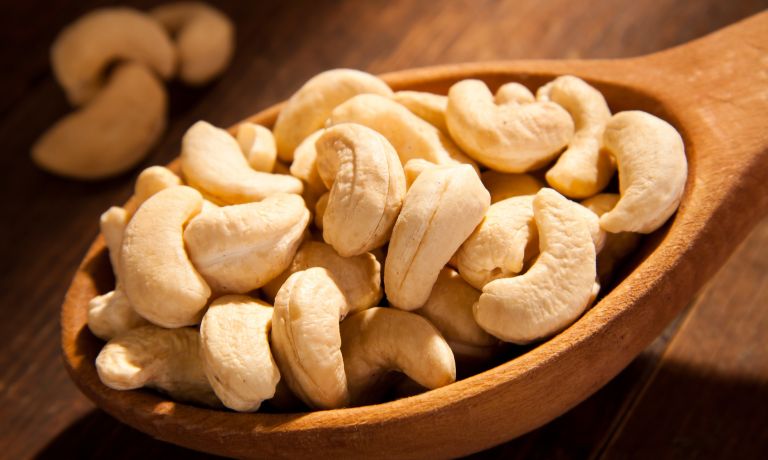
Substitutes For Cashews
Cashews are a popular nut, often used in dishes and desserts.
However, if you don’t have access to them or simply prefer other nuts, many other options are available.
Almonds
Almonds are nuts that can be used as a substitute for cashews in cooking.
They have an intense, nutty flavor and crunchy texture that works well in many recipes.
[display-posts id=”2160″ image_size=”thumbnail” posts_per_page=”1″]
The nuts offer several health benefits, including key nutrients such as vitamin E, magnesium, and monounsaturated fats.
They also help to boost energy levels and reduce the risks of heart disease.
Almonds can replace cashews in many dishes, such as salads, stir-fries, desserts, and baked goods.
You can also ground them into flour or a meal for baking and thickening sauces and soups.
Almonds are crunchier than cashews, so recipes may require adjustments to compensate for this difference.
Additionally, the nuttiness of almonds can be more intense than the sweetness of cashews, so the amounts of other flavorings may need to be adjusted accordingly.

Hazelnuts
Hazelnuts, also known as filberts or cobnuts, are the edible nuts of the hazel tree.
They have a sweet, nutty flavor that can be used in savory and sweet dishes.
As a substitute for cashews in cooking, hazelnuts provide a unique flavor profile that can enhance any dish.
Furthermore, hazelnuts are high in dietary fiber, protein, and important vitamins and minerals such as thiamin, folate, magnesium, phosphorus, and vitamin E.
All these nutrients can help boost overall health and provide essential nutrition for the body.
Hazelnuts also contain healthy fats, including polyunsaturated and monounsaturated types, which can help reduce cholesterol and improve heart health.
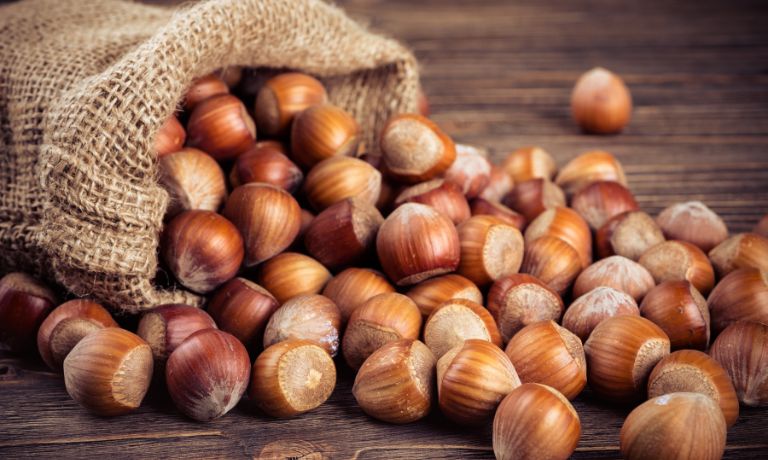
Peanuts
Peanuts are legumes, not nuts, and they come from the same family as beans, lentils, and peas.
When raw, they have a slightly crunchy texture that softens to an earthy flavor when cooked.
[display-posts id=”2153″ image_size=”thumbnail” posts_per_page=”1″]
Peanuts are high in nutrients like protein, fiber, monounsaturated fat, vitamin E, magnesium, and phosphorus.
They can be eaten raw or roasted and are often added to salads or curries for texture.
You can also ground peanuts into a paste to make sauces like peanut butter or used as the main ingredient in savory dishes like stir-fries.
Peanuts can be used instead of cashews to make sauces, curries, salads, stir-fries, and more.
They’re also great for adding nutrition and texture to dishes without removing any flavor.
Plus, since peanuts are a legume rather than a nut, they are a great option for those with nut allergies.

Walnuts
Walnuts are nuts from the walnut tree, native to certain parts of Europe, Asia, and North America.
These nuts have a distinctive flavor and are considered one of the healthiest.
Walnuts contain several essential vitamins and minerals and omega-3 fatty acids, which are important for overall health.
These nuts can be used in place of cashews in many recipes.
They have a slightly sweet flavor and crunchy texture similar to cashews, making them an excellent substitution.
Walnuts also contain more fiber than cashews, so they may help increase the amount of dietary fiber in certain dishes.
Additionally, walnuts can help provide a nutty flavor to savory dishes and baked recipes.
Walnuts are also great sources of plant-based proteins and healthy fats that can be an important part of vegetarian and vegan meals.

Pine Nuts
Pine nuts, also known as pignolias, are edible seeds from several species of pine trees.
They have a delicate nutty flavor and can be used in sweet and savory dishes.
[display-posts id=”2930″ image_size=”thumbnail” posts_per_page=”1″]
These nuts can be easily toasted and added to salads, sauces, or pasta dishes for extra crunch.
They also make an excellent addition to baked goods.
They are also rich in protein, healthy fats, and essential vitamins and minerals like magnesium, phosphorus, zinc, iron, and copper.
They can help with digestion and are an excellent source of energy.
Pine nuts’ calorie content and nutrient profile make them a great alternative to cashews for those looking for a healthier snack.
Additionally, pine nuts are an affordable and widely available ingredient, making them an ideal choice for cooking.
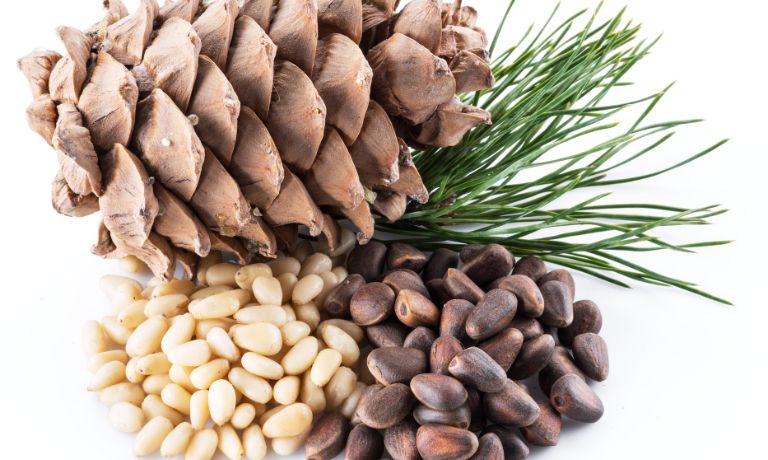
Brazil Nuts
Brazil Nuts are large seeds found in the South American rainforest.
They have a mild, nutty flavor and either a creamy or crunchy texture, depending on how they are prepared.
Brazil nuts offer various health benefits due to their high protein content, selenium, healthy fats, calcium, magnesium, phosphorus and zinc.
Brazil nuts can be eaten raw or roasted as a snack or added to salads and granola for some extra crunch.
They are also used in baking and desserts such as cookies, muffins and other pastries.
Brazil nuts can be a great way to get essential vitamins and minerals while incorporating variety into your diet!
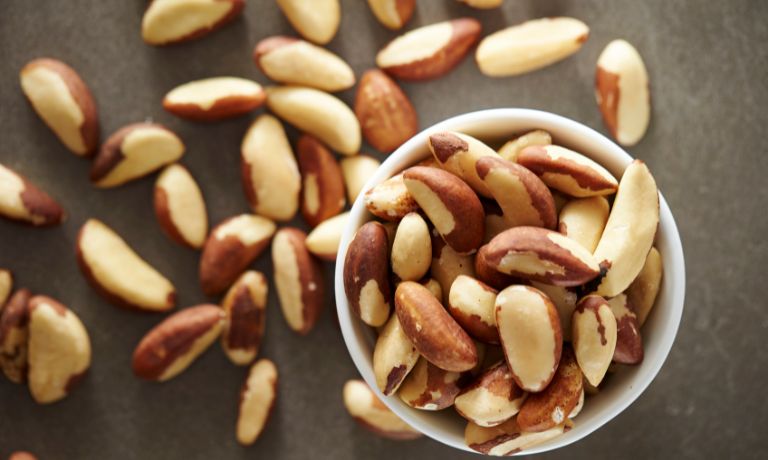
Macadamia Nuts
Macadamia nuts are native to Australia and have a creamy, nutty flavor.
They are a popular substitute for cashews in baking and cooking because of their buttery texture and mild taste.
[display-posts id=”2099″ image_size=”thumbnail” posts_per_page=”1″]
Macadamias can be roasted or raw, chopped into small pieces, or ground and used as a flour substitute.
When cooked with other ingredients, Macadamias provide a delicious nutty flavor and rich texture.
They are also an excellent source of healthy fats, minerals, and vitamins.
Macadamia nuts can add crunchiness to salads, desserts, and savory dishes.
Additionally, they can easily replace cashews in vegan cheese recipes or other vegan baking projects as they contain similar textures and flavors.
Macadamias are a great alternative to cashews for several reasons, including their versatility, delicious flavor, and their nutritional benefits.
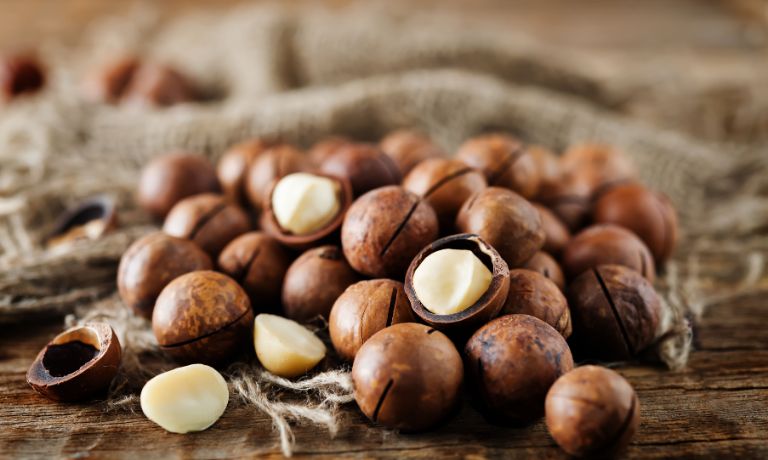
FAQs
What Nut Has A Flavor Akin To Cashew?
The macadamia nut is the closest to cashew in terms of flavor.
Macadamias are creamy and slightly sweet, which makes them a great substitution for cashews in recipes.
Can You Make A Sauce With Almonds Instead Of Cashews?
Yes, you can make a sauce with almonds instead of cashews. Almonds have a slightly different flavor profile than cashews.
However, the basic steps are still the same: blend soaked almonds with garlic, onion, nutritional yeast, lemon juice and seasonings until you reach your desired consistency.
Are Peanuts A Decent Cashew Alternative?
Yes, peanuts can be a decent cashew alternative.
They are lower in fat than cashews and have a similar texture when cooked.
Peanuts also contain healthy fats and protein, making them a nutritious choice for snacks or meals.
Conclusion
When finding a substitute for cashews, the options are plentiful.
Walnuts, pine nuts, Brazil nuts and macadamia nuts are all excellent alternatives that can replace cashews in recipes.
They offer a variety of flavors, textures, and nutrients that make them an ideal choice for vegetarian and vegan cooking.
Whether you want to add some crunch to your salads, flavor to your savory dishes, or deliciousness to your desserts, these nuts will make a great addition!

